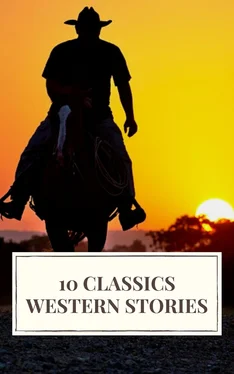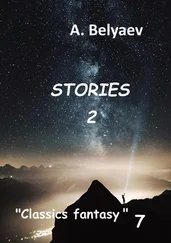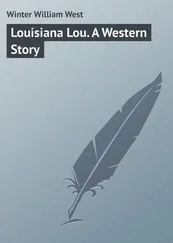Samuel Merwin - 10 Classics Western Stories
Здесь есть возможность читать онлайн «Samuel Merwin - 10 Classics Western Stories» — ознакомительный отрывок электронной книги совершенно бесплатно, а после прочтения отрывка купить полную версию. В некоторых случаях можно слушать аудио, скачать через торрент в формате fb2 и присутствует краткое содержание. Жанр: unrecognised, на английском языке. Описание произведения, (предисловие) а так же отзывы посетителей доступны на портале библиотеки ЛибКат.
- Название:10 Classics Western Stories
- Автор:
- Жанр:
- Год:неизвестен
- ISBN:нет данных
- Рейтинг книги:3 / 5. Голосов: 1
-
Избранное:Добавить в избранное
- Отзывы:
-
Ваша оценка:
- 60
- 1
- 2
- 3
- 4
- 5
10 Classics Western Stories: краткое содержание, описание и аннотация
Предлагаем к чтению аннотацию, описание, краткое содержание или предисловие (зависит от того, что написал сам автор книги «10 Classics Western Stories»). Если вы не нашли необходимую информацию о книге — напишите в комментариях, мы постараемся отыскать её.
The novels are sorted alphabetically by the authors.
Content:
The Log of a Cowboy by Andy Adams
The Bridge of the Gods by Frederic Homer Balch
The Lure of the Dim Trails by B.M. Bower
Hidden Water by Dane Coolidge
The Last of the Mohicans by James Fenimore Cooper
The Prairie by James Fenimore Cooper
Salomy Jane by Bret Harte
Astoria by Washington Irving
The road to Frontenac by Samuel Merwin
That Girl Montana by Marah Ellis Ryan
10 Classics Western Stories — читать онлайн ознакомительный отрывок
Ниже представлен текст книги, разбитый по страницам. Система сохранения места последней прочитанной страницы, позволяет с удобством читать онлайн бесплатно книгу «10 Classics Western Stories», без необходимости каждый раз заново искать на чём Вы остановились. Поставьте закладку, и сможете в любой момент перейти на страницу, на которой закончили чтение.
Интервал:
Закладка:
The rebels were staggered. The trap was sprung on them before they knew that there was a trap. Those in front shrank back from the iron warriors of Multnomah, those in the rear wavered before the fierce Cayuses. They paused, a swaying flood of humanity, caught between two lines of rock.
Chapter 5 SENTENCED TO THE WOLF-DEATH.
The other, great of soul, changed not
Countenance stern.
Dante.
In that momentary pause Multnomah did something that showed the cold disdainfulness of his character as nothing else could have done. He had given the death-sign; he had not yet told how or when death was to be inflicted. He gave the sentence now , as if in utter scorn of the battle-cloud that hung quivering, ready to burst.
“He would have torn the confederacy to pieces; let him be left bound in the wood of the wolves, and torn limb from limb by them as he would have rent the tribes asunder.”
The two warriors who had brought the criminal into the council came forward, flung a covering over his head and face, and led him away. Perhaps no custom of the northwestern Indians was more sombre than this,—the covering of the culprit’s eyes from the time of his sentence till his death. Never again were those eyes to behold the sun.
Then, and not till then, did Multnomah turn his gaze on the malcontents, who stood, desperate but hesitating, hemmed in by the Willamettes and the Cayuses.
“You have chosen the tomahawk instead of the peace-pipe. Shall Multnomah choose the tomahawk also? Know you not that Multnomah holds your lives in his hand, and that he can crush you like an eggshell if he chooses?”
The war-chief lifted his arm as he spoke, and slowly closed his fingers till his hand was clinched. The eyes of Willamette and tributary alike hung on those slowly closing fingers, with their own strained on their tomahawks. That was half the death-signal! Would he give the other half,—the downward gesture? The baffled rebels tasted all the bitterness of death in that agonizing suspense. They felt that their lives were literally in his grasp; and so the stern autocrat wished them to feel, for he knew it was a lesson they would never forget.
At length he spoke.
“Drop your weapons and Multnomah will forget what he has seen, and all will be well. Strike but a blow, and not one of you will ever go back over the trail to his home.”
Then he turned to the chiefs, and there was that in his tones which told them to expect no mercy.
“How comes it that your braves lift their tomahawks against Multnomah in his own council and on his own land? Speak! chiefs must answer for their people.”
There was sullen silence for a little time; then one of them muttered that it was the young men; their blood was hot, they were rash, and the chiefs could not control them.
“Can you not control your young men? Then you are not fit to be chiefs, and are chiefs no longer.” He gave a signal to certain of the Willamettes who had come up behind the rebellious leaders, as they stood confused and hesitating in the council. They were seized and their hands bound ere they could defend themselves; indeed, they made no effort to do so, but submitted doggedly.
“Take them down the Wauna in the sea-canoes and sell them as slaves to the Nootkas who hunt seal along the coast. Their people shall see their faces no more. Slaves in the ice-land of the North shall they live and die.”
The swarthy cheeks of the captives grew ashen, and a shudder went through that trapped and surrounded mob of malcontents. Indian slavery was always terrible; but to be slaves to the brutal Indians of the north, starved, beaten, mutilated, chilled, and benumbed in a land of perpetual frost; to perish at last in the bleak snow and winter of almost arctic coasts,—that was a fate worse than the torture-stake.
Dreadful as it was, not a chief asked for mercy. Silently they went with their captors out of the grove and down the bank to the river’s edge. A large sea-canoe, manned by Chinook paddlers, was floating at the beach. They quickly embarked, the paddles dipped, the canoe glided out into the current and down the stream. In a few moments the cottonwood along the river’s edge hid it from sight, and the rebels were forever beyond the hope of rescue.
Swift and merciless had the vengeance of Multnomah fallen, and the insurrection had been crushed at a blow. It had taken but a moment, and it had all passed under the eyes of the malcontents, who were still surrounded by the loyal warriors.
When the canoe had disappeared and the gaze of that startled and awed multitude came back to Multnomah, he made a gesture of dismissal. The lines drew aside and the rebels were free.
While they were still bewildered and uncertain what to do, Multnomah instantly and with consummate address called the attention of the council to other things, thereby apparently assuming that the trouble was ended and giving the malcontents to understand that no further punishment was intended. Sullenly, reluctantly, they seemed to accept the situation, and no further indications of revolt were seen that day.
Popular young men, the bravest of their several tribes, were appointed by Multnomah to fill the vacant chieftainships; and that did much toward allaying the discontent. Moreover, some troubles between different tribes of the confederacy, which had been referred to him for arbitration, were decided with rare sagacity. At length the council ended for the day, the star of the Willamettes still in the ascendant, the revolt seemingly subdued.
So the first great crisis passed.
That evening a little band of Willamette warriors led the rebel sachem, still bound and blindfolded, down to the river’s bank, where a canoe lay waiting them. His wife followed and tried to enter it with him, as if determined to share his fortunes to the very last; but the guard thrust her rudely away, and started the canoe. As it moved away she caught the prow wildly, despairingly, as if she could not let her warrior go. One of the guards struck her hands brutally with his paddle, and she released her hold. The boat glided out into the river. Not a word of farewell had passed between the condemned man and his wife, for each disdained to show emotion in the presence of the enemy. She remained on the bank looking after him, mute and despondent,—a forlorn creature clothed in rags and emaciated with hunger, an outcast from all the tribes. She might have been regarded as a symbolic figure representing woman among the Indians, as she stood there with her bruised hands, throbbing with pain where the cruel blow had fallen, hanging, in sullen scorn of pain, uncared for by her side. So she stood watching the canoe glide down the river, till it was swallowed up in the gathering shadows of evening.
The canoe dropped down the river to a lonely point on the northern shore, a place much frequented by wolves. There, many miles below the encampment on the island, they disembarked and took the captive into the wood. He walked among them with a firm and even tread; there was no sign of flinching, though he must have known that his hour was close at hand. They bound him prostrate at the foot of an oak, tying him to the hard, tough roots that ran over the ground like a network, and from which the earth had been washed away, so that thongs could be passed around them.
Head and foot they bound him, drawing the rawhide thongs so tight that they sank into the flesh, and knotting them, till no effort possible to him could have disentangled him. It was on his lips to ask them to leave one arm free, so that he might at least die fighting, though it were with but one naked hand. But he hated them too much to ask even that small favor, and so submitted in disdainful silence.
The warriors all went back to the canoe, except one, an old hunter, famed for his skill in imitating every cry of bird or beast. Standing beside the bound and prostrate man, he sent forth into the forest the cry of a wolf. It rang in a thousand echoes and died away, evoking no response. He listened a moment with bated breath, but could hear nothing but the deep heart-beat of the man at his feet. Another cry, with its myriad echoes, was followed by the oppressive sense of stillness that succeeds an outcry in a lonely wood. Then came a faint, a far-off sound, the answer of a wolf to a supposed mate. The Indian replied, and the answer sounded nearer; then another blended with it, as the pack began to gather. Again the Indian gave the cry, wild and wolfish, as only a barbarian, half-beast by virtue of his own nature, could have uttered it. An awful chorus of barking and howling burst through the forest as the wolves came on, eager for blood.
Читать дальшеИнтервал:
Закладка:
Похожие книги на «10 Classics Western Stories»
Представляем Вашему вниманию похожие книги на «10 Classics Western Stories» списком для выбора. Мы отобрали схожую по названию и смыслу литературу в надежде предоставить читателям больше вариантов отыскать новые, интересные, ещё непрочитанные произведения.
Обсуждение, отзывы о книге «10 Classics Western Stories» и просто собственные мнения читателей. Оставьте ваши комментарии, напишите, что Вы думаете о произведении, его смысле или главных героях. Укажите что конкретно понравилось, а что нет, и почему Вы так считаете.












